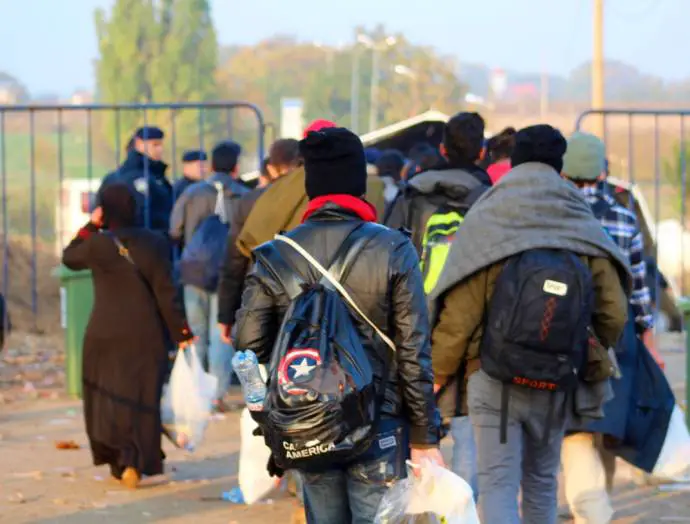After Slovenia took in around 70,000 refugees during the Yugoslav war, things were much calmer until another surge in 2000, when more than 9,000 asylum requests were filed in the country during the refugee wave from Iran.
The period after that mostly saw the number of applications declining, until the start of a major refugee wave in the autumn of 2015 which took the number of asylum seekers in Slovenia to well over 1,000 in 2016 and 2017.
While many of those who filed for asylum ended up following those who only passed through Slovenia, Slovenia granted asylum status to about one in ten applicants - to 152 in 2017 and to 170 in 2016.
One of them is Ali, a 50-year-old Syrian, who is living in Slovenia with his wife and two children.
"Job - language - problem," he told the STA in basic Slovenian, which he started learning as part of a three-month orientation programme organised by NGO Slovenian Philanthropy.
Ali praised the programme, whose content is laid down by law. Running 25 hours each week, it also includes assistance in securing necessary documents and things like welfare, healthcare and kindergarten applications.
As envisaged, he followed it up with a 300-hour course of Slovenian and on Slovenian society and now has a basic grasp of the language, which is however still too modest to deal with situations like a doctor appointment.
His youngest son, who was five when the family came to Slovenia and is already attending primary school, has emerged as the family's designated translator.
While Ali's 18-year-old son also has a good command of the language, his biggest challenges are history and geography, which differ substantially from what he learned in Syria. He finished primary school in Syria but does not have a school-leaving diploma. He will start his education in Slovenia in the seventh grade of primary school for adults.
According to the Education Ministry, there are currently 178 asylum seekers or persons with asylum status in the Slovenian education system - 22 in kindergartens, 78 in primary schools, 17 in secondary schools, 40 in primary schools for adults, and 14 at faculties, while 7 unaccompanied minors are included in a basic literacy programme.
Finding a job is a tough challenge, the issues on the side of the migrants including the language and frequently missing documentation to prove their level of education.
There are currently 262 persons with asylum status registered at the Employment Service. Jobs were found by more than 10 each month this year.
The service has drawn up special measures and has so far included 18 persons with asylum status in on-the-job training programmes with 17 employers.
Ali is a trained wood turner, while he has also worked as a tailor and photographer and used to have a studio in downtown Aleppo. His wife is a hairdresser, but is not overly optimistic about her job prospects in Slovenia.
Ali, for his part, is optimistic although he fears many employers hire refugees because they can pay them even less for what are already poorly paid jobs.
Another issue for refugees is housing. There are only two integration homes in Slovenia. There is room for 15 at the one in Ljubljana and 45 in Maribor.
Ali's family found a home in Medvode outside Ljubljana after a long search. He said many doors were closed to them immediately after the owners realised their status.
The Syrian is aware that his future is uncertain. While the rent and utility costs are presently at around EUR 850 per month, the family receives slightly over EUR 1,000 in welfare allowance.
The family also receives an allowance of slightly over EUR 500 for private accommodation which is granted to persons with asylum status for a period of
18 months with the possibility of extension if they regularly attend Slovenian language classes.
If Ali does not find a job, the family will probably move on. He said he wishes to secure a better future for all of his children and if possible also reunite with his 24-year-old daughter and 22-year-old son who studied in Lebanon but were not able continue due to lack of funds.






